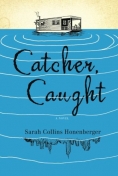BKMT READING GUIDES
Catcher, Caught
by Sarah Collins Honenberger
Paperback : 256 pages
0 club reading this now
1 member has read this book
Introduction
(After an earth-shattering diagnosis of leukemia, 15-year-old Daniel Landon sees a reflection of himself in the words of J.D. Salinger's�The Catcher in the Rye. Inspired by Holden Caulfield, Daniel begins to question the intentions and authority of those around him in his own search for identity as he faces death. Tired of his cramped surroundings and hippie parents? alternative approaches to his treatment, he follows the footsteps of Caulfield to New York City in search of the same eternal truths, only to discover the importance of home when death looms. A coming of age story, a love story, and a new classic, Catcher, Caught will engage the imagination of more than one generation, searching for lasting values.
National Book Award Winner Kathryn Erskine Interviews Sarah Collins Honenberger
Kathryn Erskine is the author of Mockingbird, the 2010 National Book Award Winner for Young People's Literature. She recently interviewed Sarah Collins Honenberger about Catcher, Caught, inspiration, and why she writes for young people.

Inspired by J.D. Salinger's The Catcher in the Rye, (and the fact that today's younger readers aren?t as inspired by it), Sarah Collins Honenberger gives us a compelling book about Daniel Solstice Landon who wants to follow in Holden Caulfield's footsteps. The heartrending thing about Daniel? He has cancer and doesn?t have long to live, particularly since his hippie parents don?t believe in standard cancer treatment. As the discussion questions at the end of the book highlight, what exactly is a minor's right to receive treatment? Against his parents? will? And while that might feel clear and justifiable, how far along that line of minors? rights do we go? And how do your actions affect others, even if you?re dying? Fascinating issues, and all of them are raised here with snappy dialog and humor, as well as sobering seriousness. But I should let you hear from the author herself rather than me. --Kathryn Erskine
Erskine: Why did you write this book?
Honenberger: Headline stories about kids whose parents refuse to follow standard medical treatment fascinated me. It's hard to contradict your parents, but the possibility of dying raises the stakes. Coupled with the typical immortality teenage boys feel. I wanted to explore that 16-year-old boy's point of view in the face of a fatal illness, to see if I could find out what might change his mind about that automatic belief in his own invincibility.
Erskine: Who or what has been the greatest inspiration for your stories?
Honenberger: In my 30 years of family law practice, I saw lots of families in distress. The wide discrepancy between what each party in a crisis feels and sees is one of the biggest reasons for family conflicts. Writing out those crises can illuminate those divergent realities. Stories often help people"walk in someone else's shoes."
Erskine: Why do you write for young people?
Honenberger: I didn?t set out to write for young people in Catcher, Caught, but when I heard that today's teenagers weren?t connecting with Holden Caulfield from The Catcher in the Rye, I thought that was a tragic loss. Holden's story, his sadness, was a crucial part of my youth, seeing how quickly someone could feel lost and disconnected. I hoped by letting Daniel tell his story that today's teenagers might connect with Holden's issues, his sense of fairness and generosity of spirit despite his being on the outside, and his failures. In the end, even with his confusion and depression, he defends a strong morality in his analysis of suicide, sex, relationships with his brothers and his sister, and in how he treats the other prep school boys.
Erskine: How do your ideas come to you?
Honenberger: Something I overhear or see on the side of the road. It's a visual, usually, that starts me thinking, why was that woman yelling or why was that man wearing his wading boots.
Erskine: What's an important "nugget" that you?d like readers to take away from your book?
Honenberger: Life is shorter than you think and you?ll get more out of every experience if you remember it's about the experience, not about you.
Discussion Questions
No discussion questions at this time.Book Club Recommendations
Recommended to book clubs by 1 of 1 members.
Book Club HQ to over 90,000+ book clubs and ready to welcome yours.
Get free weekly updates on top club picks, book giveaways, author events and more








